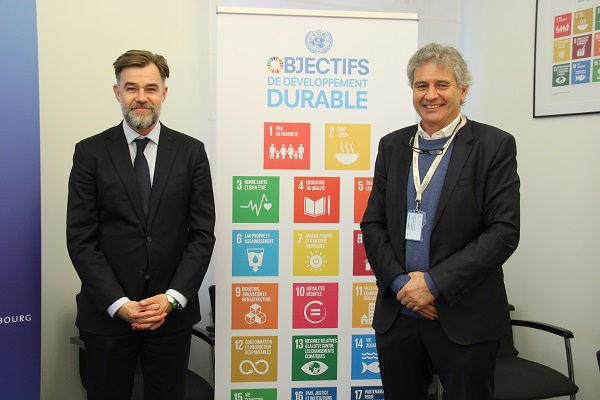 L-R: Franz Fayot, Luxembourg's Minister for Development Cooperation and Humanitarian Affairs; Patrick Losch, President of ADA;
Credit: MAEE
L-R: Franz Fayot, Luxembourg's Minister for Development Cooperation and Humanitarian Affairs; Patrick Losch, President of ADA;
Credit: MAEE
On Wednesday 15 December 2021, Luxembourg's Minister for Development Cooperation and Humanitarian Affairs, Franz Fayot, signed an agreement, on behalf of the Ministry of Foreign and European Affairs, granting financial support to the non-profit organisation Appui au Développement Autonome (ADA).
ADA is a Luxembourgish non-profit which works for inclusive development at the service of vulnerable populations.
"The signing of this new mandate is the consequence, as well as the promise, of a fruitful collaboration which gives tangible results in the field and allows the development of large-scale projects with high impact", explained Laura Foschi, Executive Director of ADA.
This commitment by the Luxembourg development cooperation programme will cover a period of four years, from 2022 to 2025, for a budget of €63 million, 59% of which is funded by the development cooperation programme. Other public and private funding sources cover the remaining 41%.
These resources will finance the activities proposed by ADA and validated by the Ministry of Foreign and European Affairs, focused on three priority themes: youth entrepreneurship, agricultural and forestry value chains and access to basic services, as well as three transversal dimensions relating to climate change, gender issues and the role of women and the use of digital technologies.
During this new mandate, the main target groups for ADA interventions in developing countries will be as follows: vulnerable households, especially those with limited access to basic services, such as water and energy; young entrepreneurs, men and women, who face all the more serious constraints of access to employment and socio-professional integration; small family farms and other actors in agricultural and forestry value chains exposed to climate risks and economic insecurity.
Through its activities, ADA will continue to support the priorities of the Luxembourg development cooperation programme, which include access to responsible agricultural financing, markets and innovative practices for small farmers, as well as access to adequate financial and economic opportunities for young people and women.
The partnership between ADA and the Luxembourg development cooperation programme has existed for many years. According to the Foreign Ministry, the previous mandate, which covered the period 2018 to 2021, produced encouraging results, despite the upheavals caused by the health crisis in 2020 and 2021. Concretely, ADA was able to support several hundred microfinance institutions (MFIs) and provide tailored access to financial and non-financial services to more 100,000 beneficiaries. These results have been achieved through the implementation of a variety of projects adapted to the needs of many partners in the field, by mobilising the expertise of a team of more than 40 people and financial resources of €43 million, 76% of which came from the Luxembourg development cooperation programme mandate.
During the signing, Minister Franz Fayot specified that “the renewal of this mandate confirms ADA's central role within the framework of the Luxembourg Cooperation, as an expert actor in inclusive finance and a knowledge catalyst. With relevant responses to development needs, effective interventions and adequate use of its resources, ADA undoubtedly fulfills its role as a non-governmental development organisation [...] by contributing to the improvement of the living conditions of vulnerable populations through the implementation of innovative solutions facilitating inclusive development and the achievement of sustainable development objectives”.
During this new mandate, the interventions of ADA teams will contribute to several Sustainable Development Goals (SDGs), including the eradication of poverty (SDG 1), reducing food insecurity (SDG 2), access to decent employment and income (SDG 8), adaptation to climate change (SDG 13) and the strengthening of partnerships between different types of actors in the sector (SDG 17). They will also indirectly contribute to ensuring good health and well-being (SDG 3), quality education (SDG 4), gender equality (SDG 5), access to clean drinking water and sanitation (SDG 6), affordable clean energy (SDG 7), encouraging innovation and integration of small businesses (SDG 9), reducing inequalities (SDG 10), improved housing (SDG 11) and sustainable forest management (SDG 15).
This new mandate takes into account recent developments in the inclusive finance sector and consolidates the complementarity of the contributions of ADA and the Foreign Ministry to the SDGs and the implementation of sustainable solutions to meet the needs of vulnerable populations.
“Making inclusion and sustainability part of our programmes is one of the main keys to achieving the Sustainable Development Goals. This is what gives full meaning to the direction of this new mandate”, concluded Laura Foschi.








